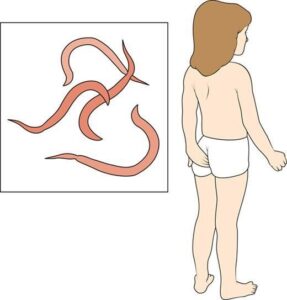SHARE WITH FRIENDS:
Enterobiasis is a parasitic disease that results from damage to the gut by small parasites.
REASONS
The disease Enterobius vermicularis (Ostritsa) occurs as a result of intestinal damage caused by worms. The disease is transmitted through household items, dirty hands and household contact. The infection can also be transmitted by inhaling dust contaminated with contaminated water or helminth eggs.
SIGNS
Symptoms of enterobiasis:
severe abdominal pain;
white spots on the face;
gnashing of teeth (during sleep)
sleep disorders (due to severe itching)
nausea;
dry mouth;
itching around the anus (worsens at night);
decreased appetite;
memory loss
false call (defecation);
flatulence;
diarrhea;
general intoxication (headache, dizziness).
DIAGNOSTICS
To determine how to treat enterobiasis, we perform the following tests:
general inspection;
analysis of feces (Parasites);
microscopic examination of milk taken from the perianal area.
TREATMENT
Many people are interested in how to treat enterobiasis. Treatment required for enterobiosis includes the following.
therapeutic enemas;
anrigelmint preparations;
adherence to a hygiene regimen.
In addition, the following is ordered:
enzyme preparations;
multivitamins;
antihistamines;
immunomodulators.
Diet
During treatment, patients are prescribed dietary table No. 4 in addition to diet:
flour products, bread, pastries;
fatty meat, fish, poultry;
canned, smoked meats;
eggs;
oils (except butter);
vegetables;
saturated broths;
berries, fruits;
sweets, honey;
coffee, cocoa;
carbonated drinks, kvass;
alcohol.
COMPLICATIONS
If enterobiosis in children is not treated in time, it can lead to the following complications:
anemia;
dysbacteriosis;
gastritis;
gastroduodenitis;
enterobiotic endometritis;
enteritis;
allergic reactions;
appendicitis;
proctite;
vulvovaginitis (in girls)
disorders of the nervous system;
inflammatory processes in the tissues of the perianal area.
PREVENTION
To prevent the disease, the following is recommended:
adherence to the rules of personal hygiene;
production of food products, compliance with sanitary and hygienic standards in public catering establishments;
monitoring the status of water sources;
immediate treatment of sewage waste.
© Doctor Muxtorov
